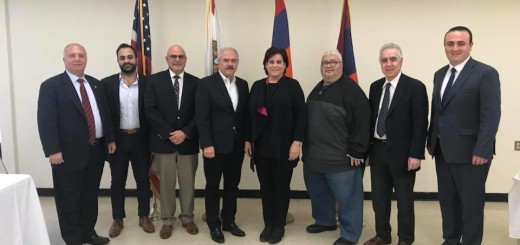Finally, After 105 Years, Syria Recognizes the Armenian Genocide
The Syrian people were the first to be aware of the Armenian Genocide as tens of thousands of Armenians were deported by Ottoman Turkey to the killing fields of the Syrian Desert at the beginning of the 20th Century. A large number of Armenian orphans were adopted by local Arabs who raised them as their children. The surviving Armenians in Aleppo, Raqqa, Deir Zor, Damascus and elsewhere were welcome by the local population. Armenians settled in their new homeland, rebuilt their lives, reestablished their cultural structures, including churches, schools, and societies and gradually prospered.
I was born in Aleppo, Syria, as some of my grandparents’ family had survived the Genocide. I had a happy childhood and had not experienced any prejudice or discrimination, despite the religious differences. Syria had its own dispute with the Republic of Turkey, such as the annexation of Iskenderun (Alexandretta) to Turkey in 1939, after an illegitimate referendum. Nevertheless, the Syrian government, in an Islamic solidarity with Turkey and unwilling to antagonize its more powerful Northern neighbor, had declined to raise the issue of the Armenian Genocide.
I recall that during the deliberations of the United Nations’ Sub-Commission on Prevention of Discrimination and Protection of Minorities in 1985, the Syrian human rights member told me that even though he was aware of the Armenian Genocide, he could not vote to adopt the report that recognized it, as he would be dismissed from his job. Under the circumstances, I asked him to be absent from the hall during the voting. He did, and the UN report was adopted by an overwhelming majority.
In the years prior to the 2011 civil war in Syria, the relationship between Syria and Turkey had improved to the point that the the presidents of the two countries met often and went on vacation together. The Syrian government even banned the sale of books on the Armenian Genocide in Syrian bookstores. During those honeymoon years, I was informed that during the visit of Catholicos Aram I to Damascus, Pres. Bashar al-Assad had told him that Armenians should forget about the Armenian Genocide, open the border and establish friendly relations with Turkey.
When I visited Damascus in 2009, an Armenian friend with access to the Presidential Palace, tried to arrange a meeting for me with Pres. Assad. I wanted to warn Pres. Assad that his honeymoon with the Turkish President could come to an abrupt end and Erdogan, as an untrustworthy ally, could betray him. Of course, I had no idea that two years after my visit to Syria, there would be a massive invasion of Syria by radical Islamic terrorists armed and supported by Turkey. Unfortunately, I did not have the chance to meet Pres. Assad. His Chief of Staff refused to arrange the meeting, telling my Armenian friend that he could not allow such a meeting given my many critical writings of Turkey. He said that Turkey would cut off its friendly relations with Syria if Erdogan found out that Pres. Assad had met with me!
Edmon Marukyan, head of the Bright Armenia opposition party in the Armenian Parliament, told reporters last week that when he met Pres. Assad in Damascus during his trip to Syria in 2014, Assad said: “I was being told in Armenia that I shouldn’t trust Erdogan so much, I didn’t listen to you.” Pres. Assad made an official trip to Armenia in June 2009. However, violating Armenian protocol, he refused to visit the Armenian Genocide Memorial in Yerevan to pay homage to the Genocide victims out of concern for Turkish criticism.
Pres. Assad told Agence France Presse (AFP) in January 2014 that the brutal attacks on Syria reminded him of “the massacres perpetrated by the Ottomans against the Armenians, when they killed a million and a half Armenians, and half a million Orthodox Syriacs in Syria and in Turkish territory.”
The unanimous decision by the Syrian Parliament on February 13, 2020 is the first official recognition of the Armenian Genocide by Syria. The text of the parliament’s resolution also referred to the genocide of Assyrians and Syriacs. Some have expressed their unhappiness that the Syrian government finally recognized the Armenian Genocide only when it suited its own political interests. While that is true, Armenians have to be realistic. No country is going to adopt a decision that is contrary to its national interests. It is true that the Syrian Parliament’s decision is mostly due to the recent Turkish invasion of Northern Syria. However, the decision is not wrong. It is the right thing to do. It is never the wrong time to do the right thing. The wrong was not recognizing the Armenian Genocide for all those years. Thus Syria became the second Arab country after Lebanon to have recognized the Armenian Genocide. We hope other Arab countries, such as Egypt, Iraq and Jordan, will follow suit.
Two immediate benefits of the Syrian Parliament’s recognition of the Armenian Genocide are:
1) The mass media once again reminded the world’s public opinion about the dastardly act of the Armenian Genocide committed by Ottoman Turkey, putting one more nail on the coffin of Turkish denial.
2) The Turkish government issued a statement denying the Armenian Genocide and condemning the Syrian government which further publicized the Turkish genocide of the Armenians.
Armenians around the world welcomed Syria’s recognition of the Armenian Genocide, further squeezing the noose around Turkish denialism. As the saying goes, “Better late than Never!”







